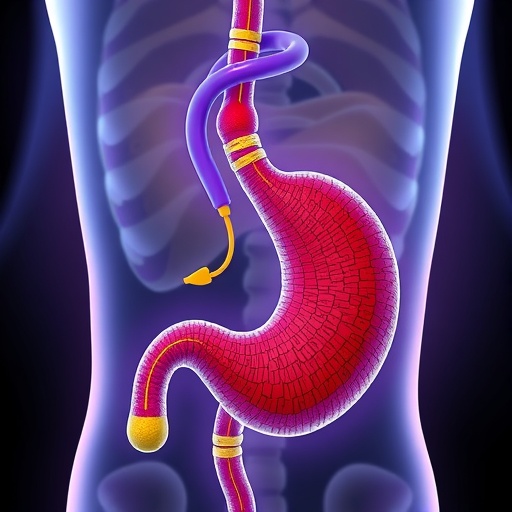In a groundbreaking study poised to reshape our understanding of cancer progression, researchers have unveiled a critical molecular mechanism underlying gastric cancer’s aggressive nature. This novel insight centers on a positive feedback loop involving UPP1 and ARNT, two pivotal proteins that orchestrate metabolic reprogramming within cancer cells, fueling their rapid growth and survival.
Gastric cancer remains one of the leading causes of cancer-related mortality worldwide. Despite advances in treatment, late diagnosis and aggressive tumor biology limit patient prognosis. A deeper understanding of the molecular drivers that enable gastric cancer cells to proliferate rapidly and resist therapy is vital to develop more effective interventions. This recent study shines a light on how cancer metabolism—a hallmark of malignancy—is hijacked through specific signaling pathways to sustain malignant phenotypes.
The investigative team, led by Liu, Ma, and Feng, meticulously mapped the interplay between uridine phosphorylase 1 (UPP1) and aryl hydrocarbon receptor nuclear translocator (ARNT). UPP1, an enzyme involved in pyrimidine metabolism, and ARNT, a transcription factor critical for cellular responses to environmental stimuli, interact in a synergistic loop. This loop amplifies metabolic shifts that favor cancer cell proliferation and survival.
Metabolic reprogramming in cancer is the process where tumor cells alter their metabolism to meet the heightened energy and biosynthetic demands required for uncontrolled growth. The UPP1/ARNT axis appears to be a master regulator of this shift in gastric cancer cells. By elevating UPP1 expression, ARNT promotes an adaptive metabolic environment that supports rapid nucleotide synthesis and energy production, essential for sustaining high replication rates.
Intriguingly, the feedback loop functions such that UPP1 activity enhances ARNT expression, which in turn upregulates UPP1 further. This cyclical reinforcement produces a potent amplification effect, escalating the metabolic reprogramming cascade. The amplified metabolic flux feeds into nucleotide turnover and bioenergetics, empowering gastric cancer cells to thrive even under metabolic stresses like hypoxia or nutrient limitation—which are common in tumor microenvironments.
The researchers employed a compendium of experimental techniques including gene expression analysis, protein interaction mapping, and metabolic flux assays. Through these approaches, they demonstrated that disrupting the UPP1/ARNT loop significantly impairs tumor cell proliferation and invasiveness both in vitro and in vivo models. This points to the feedback loop not just as a molecular signature of aggressive gastric cancer but as a tangible therapeutic target.
Additionally, the study uncovered that elevated UPP1 and ARNT levels correlate strongly with clinical severity and poor patient prognosis. Analysis of patient tumor samples showed that those with heightened expression of these proteins exhibited more advanced disease stages and diminished survival rates. Therefore, this molecular circuitry not only drives malignancy mechanistically but also serves as a predictive biomarker.
The therapeutic implications are profound. Targeting either UPP1 enzymatic activity or ARNT-mediated transcriptional programs could disrupt the metabolic reprogramming vital to tumor sustainability. Small molecule inhibitors, RNA interference strategies, or CRISPR-mediated gene editing could feasibly attenuate this feedback loop. Such interventions could improve treatment response and limit the aggressive spread of gastric cancer.
Beyond gastric cancer, this study adds to a growing body of evidence emphasizing metabolism’s role in oncogenesis. It reveals how seemingly disparate molecular components, when linked in a feedback loop, can exert outsized influence on cancer biology. This concept may inspire similar investigations into other tumor types where UPP1 or ARNT-related pathways are dysregulated.
Furthermore, the findings highlight metabolism as a double-edged sword—both a vulnerability and a strength for cancer cells. While reprogrammed metabolism supports growth, it also creates dependencies that therapies can exploit. Understanding these dependencies enriches the arsenal of approaches available to oncology researchers striving to outsmart cancer’s adaptability.
The research team plans to expand their work by screening for pharmacological agents that can selectively inhibit the UPP1/ARNT axis. They also aim to investigate patient-derived xenograft models to better simulate human tumor biology and heterogeneity. Collaboration with clinical oncologists is anticipated to translate these molecular insights into trials that test safety and efficacy in human subjects.
In summary, the identification of the UPP1/ARNT positive feedback loop as a metabolic driver of gastric cancer presents a paradigm shift in targeting tumor metabolism. It embodies the intricate molecular crosstalk exploited by cancer cells to maintain their malignant lifestyle. With further validation, this discovery could herald a new class of metabolism-focused treatments that fundamentally alter gastric cancer management and outcomes.
As the fight against gastric cancer intensifies, molecular revelations such as this kindle hope for more precise, potent, and personalized therapeutic strategies. By unraveling the metabolic circuitry sustaining tumor aggression, scientists open avenues that extend well beyond this single cancer type. The promise of converting molecular insight into tangible patient benefit shines brighter with every advance in understanding the complexity of cancer metabolism.
Subject of Research: Gastric cancer progression and metabolic reprogramming mediated by UPP1/ARNT feedback loop.
Article Title: UPP1/ARNT positive feedback loop drives gastric cancer progression through metabolism reprogramming.
Article References:
Liu, X., Ma, Y., Feng, C. et al. UPP1/ARNT positive feedback loop drives gastric cancer progression through metabolism reprogramming. Med Oncol 43, 21 (2026). https://doi.org/10.1007/s12032-025-03120-6
Image Credits: AI Generated
DOI: https://doi.org/10.1007/s12032-025-03120-6
Tags: aggressive tumor biologyaryl hydrocarbon receptor nuclear translocator rolecancer biology and treatmentcancer cell proliferation mechanismscancer metabolism and therapy resistancegastric cancer metabolismmetabolic reprogramming in tumorsmetabolic shifts in cancer cellsmolecular drivers of gastric cancernovel cancer research findingsUPP1 ARNT signaling pathwayuridine phosphorylase 1 function





